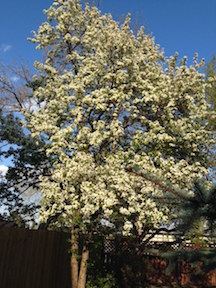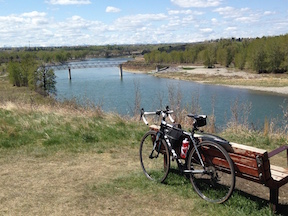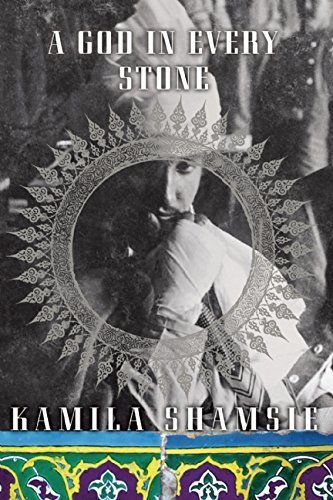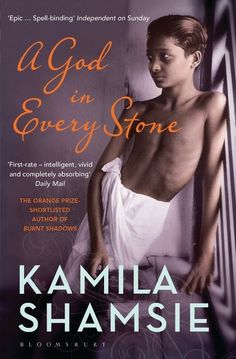
Spring continues to unfold here. More trees are in bloom and I’ll be planting the annual geraniums and other flowers soon. Meanwhile the hub and I are training on the side for a couple of upcoming bike ride events that we optimistically signed up for. Hopefully they won’t kill us. So we are bicycling most weekends over hill and dale. It’s nice but also a bit exhausting.

See my chariot at left. Our first event takes place in the mountains next weekend so I’ll try to take some good photos to post. Meanwhile below is a review of the book I finished this week.

I don’t think I knew exactly what I was getting into when I picked up Kamila Shamsie’s 2014 novel “A God in Every Stone.” I got it at the library after it was shortlisted for the Baileys Prize for Women’s Fiction and the Walter Scott Prize for Historical Fiction, both of which will announce their winners in early June.
I thought “A God in Every Stone” would be a bit of a love story about a couple of archaeologists from different backgrounds, searching ancient ruins, during tempestuous historical times. Maybe I thought it’d be a bit like Lily King’s 2014 novel “Euphoria.” Sure the novel starts out like that but then it focuses more on the struggle for Indian independence, spanning World War I to the waning days of the British Empire.
In the novel, Vivian Rose is a young British woman who goes to Turkey in 1914 on an archaeological dig and ends up falling for an older Turkish archaeologist who’s searching for a silver circlet from the early days of the Persian Empire. All seems good and on track, but then World War I intervenes and she loses touch with her love. She spends most of the war as a nurse, witnessing horrific casualties.
Years later she travels to the Peshawar Valley (part of India then), continuing the quest for the mysterious silver circlet. She meets two brothers there, one a Pashtun soldier who fought for Britain in WWI, losing an eye, and a much younger boy who becomes her pupil and many years later an archaeologist who takes up her search for the silver circlet. The older brother gets caught up in India’s independence movement and the younger one eventually does at the book’s end when a massacre in 1930 by the British Army of nonviolent protestors brings things to a brutal head.

“A God in Every Stone” is a novel with a wide scope, a sweeping history, and it encompasses ideas about Indian independence, ethnic differences, the suffragist movement, and the Armenian genocide among other things. I found it best in its vivid atmosphere of the times and place, and many of its eloquent passages. No wonder author Kamila Shamsie was included on the Granta list in 2013 as one of Britain’s 20 best young writers today. Interestingly, she grew up in Karachi, Pakistan, and just recently became a British citizen, who now resides in London.
The troubles I had with the novel were that I was sometimes confused by the foreign names and geography of where they were, and a bit of the history and circumstances. Happenings were assumed perhaps and not explained at times. Luckily I finally found a map at the back of the book, which would’ve helped earlier if I’d seen it at the front of the book. Also I seemed to get into the characters, only to have their personal stories dropped later. Vivian Rose and the brothers were intriguing but then the closeness to them and their perspectives were lost along the way. So unfortunately I had to concentrate pretty diligently to finish the book. It wasn’t an easy read. It’s sweeping and at times disjointed. I’m glad I read it though. It gave me more perspective on a region I don’t know enough about and a feel for the turbulent days under colonialism.
How about you — have you read or heard of this author before? Or what is one of your favorite historical fiction books?

My favorite historical fiction is The World is Not Enough by Zoe Oldenbourg. It’s fabulous!
readerbuzz.blogspot.com
Thanks for the tip Deb. I will make note of that title to check out!
I have not yet read this author, but I don’t like being confused about names and geography…
Enjoy your bicycling!
Thanks for sharing…and here are MY WEEKLY UPDATES
Thanks Laurel. Yeah historical and foreign fiction is not always easy to wade through but it can be rewarding and informative. I try to mix them in every once in awhile.
Interesting commentary. I have to say that any time I hear about a book set in colonial India, I immediately flash back to The Far Pavilions. What an amazing story that entertains, educates and keeps you wholly absorbed the entire time.
Oh Thanks Michelle. You know I have not read that. So I will definitely make note to get a copy of The Far Pavilions. Great suggestion.
Haven’t heard of this book or author, but I do generally enjoy this kind of sweeping novel. Foreign names and geography can sometimes be confusing and often require a little extra effort on my part… too bad they put that map in the back of the book!!
Yeah I didn’t see the map soon enough Ugh. I was a bit lost for awhile with all the various places in the novel, but I finally got back on track. Thanks JoAnn.
Yay for biking! Definitely post some photos!
Thanks Amy. The scenery along the bike ride will be epic so I’ll post some pics. Hopefully the weather will cooperate. Cross fingers.